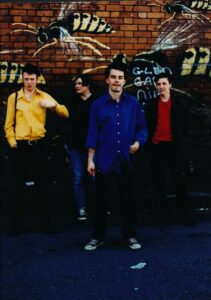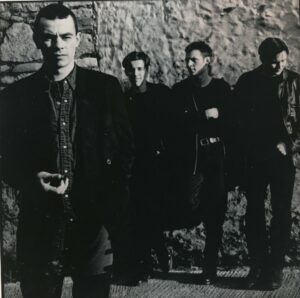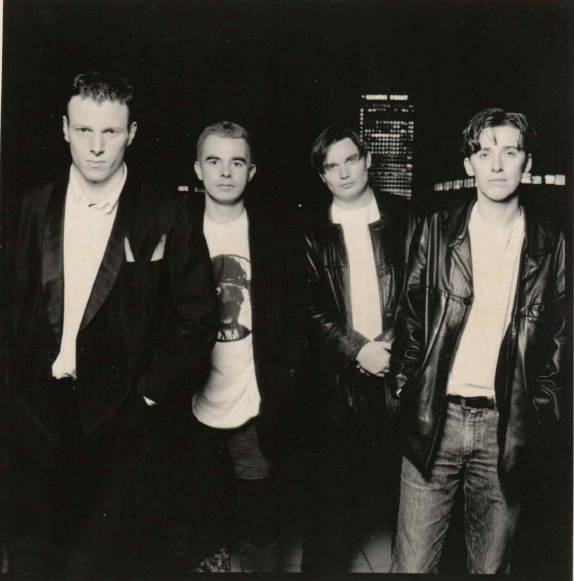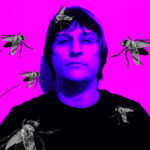One of the greatest and most underrated albums of the 1990s, Whipping Boy’s Heartworm, got a well-deserved rerelease last week. A scabrous, loud, painfully frank album chock full of tales of alcoholism, drug abuse, mental illness and domestic violence, it got rave reviews on its original release in November 1995 but in a climate dominated by Britpop, the public didn’t really bite.
But those who did get it REALLY got it, and for many of us the album was, and remains, an obsession, a soundtrack to the dark times of our lives and a record that still sounds fresh, vital and relevant some 26 years on. So I fulfilled a long held ambition (I originally wanted to do this piece on its 20th anniversary but couldn’t track down any of the band members) and gave guitarist Paul Page an epic grilling about the record and its longevity, touring with Lou Reed, and hanging out in Bono‘s bathroom…
26 years on, I and thousands of others are still obsessed with Heartworm. When you were recording it did you realise you’d come up with something special?
Right from the very start, we were always a band that had total belief in what we did. Even in the beginning, when we could barely play our instruments, we had this unshakeable belief in each other, and the noise we made together.
With Heartworm, there was definitely a sense that we had made a record we could be proud of – we knew it was a massive leap forward from our debut album Submarine, but we really had no inkling that we had created something that people would still be talking about and listening to 26 years later.
It’s a very dark, intense, brutally honest record dealing with subjects like drug abuse, schizophrenia, domestic violence, and abusive relationships. I’ve always wondered how much of it was genuinely autobiographical? A lot of it is so painful you hope it isn’t based on real life experience but it sounds so heartfelt you suspect it probably is…I’m thinking of ‘We Don’t Need Nobody Else’ and ‘A Natural’ in particular.
A lot of it is autobiographical, some of it is based on observations, the experiences of people we knew or the environment we grew up in. There is definitely pain in there that was lived through, or was lived with. I know that for certain.
But it is a dangerous assumption to make about any creative work, that every word or every image is based on direct experience. We don’t assume the author of a book that writes about murder, or drug addiction or abuse has directly experienced it. But I can say that everything we wrote about on Heartworm was authentic, whether it was based on personal experiences, or the experiences of those around us.
We recognised the stark power of some of Fearghal’s lyrics and we never attempted to sanitise what we wrote about or censor ourselves. It is very possible that worked against us in terms of the commercial success of the album, but I can honestly say we never gave that a moment’s consideration. If it sounded good to us, if it moved us, inspired us, made us feel uncomfortable, unsettled, that was enough. Because the music that influenced us, had the capacity to do that to the listener.

What were those influences exactly? I can hear some usual early 90s alternative rock influences such as MBV, Pixies, Nirvana, Radiohead – anything else?
The bands you mention are definitely in there – we were also listening to Seamonsters by The Wedding Present at that time. Loved that record. Steve Albini‘s name was floated as a possible Heartworm producer at one time but I think the record company weren’t as keen as the band! It would have been a very different record I suspect. We were also listening to Nick Cave, Echo & the Bunnymen, a lot of soundtrack music and from a guitar perspective, I loved the guitar sounds on the Kitchens of Distinction records at the time. We supported them in Dublin early in the 90s and I was like the biggest guitar nerd checking Julian’s pedals and rig!
Ireland was having a bit of a moment in the mid-90s – there was the Celtic Tiger boom, acts like U2, Sinead O’Connor, The Cranberries and The Corrs were massive, and there seemed to be ‘Irish’ pubs opening on every street in England at the time. Whilst Heartworm occasionally shows its Irish roots – the fiddle at the start of the record, the lyrics, a lot of which are in the Irish literary tradition, and ‘When We Were Young’, which could almost be a Shane MacGowan song – it felt like you were viewing all that as cynical outsiders/observers. I’m thinking of the line about Bono from ‘We Don’t Need Nobody Else’ in particular. How did you feel about it then, and now at 26 years’ distance?
We were certainly very cynical about the whole ‘Oirish’ thing at that time. We had no interest in playing on that. And we weren’t a band that spent a lot of time socialising with other Irish bands, or frequented the hangouts where musicians and celebrities congregated. I remember we won three Hot Press awards in 95 – more than U2 and The Corrs. And the after show party was in a well-known Dublin nightclub, but they wouldn’t let us in! They didn’t recognise us, while others were just waved through. We just weren’t that well known on the scene, so there was that little bit of cynicism there alright.
But Heartworm was very definitely shaped by our experiences of growing up and living in the Dublin of that time. There are loads of references in the lyrics to places we knew, or people we had encountered, and the Irishness ingrained in those songs became glaringly apparent when the record was released smack bang in the middle of Britpop. Fearghal sang in his own accent, there was no attempt to hide that, and the music didn’t follow the Britpop blueprint.
We weren’t having a direct pop at Bono in ‘We Don’t Need Nobody Else’ – that line was actually based on a funny story where Fearghal found himself in Bono’s house. That line ‘You can be a king and it all depends on the view’ was aimed at the well-heeled beneficiaries of the Celtic Tiger boom – the privileged classes. That was a period that revealed a side of us as a nation, that didn’t reflect well on us at all. Money and the pursuit of status became a national pastime – we lost the run of ourselves for a while.
I have the “Alan Partridge visits Bono’s house” scene in my head now! Tell us more…
It’s actually a true story! Fearghal got invited to his house one evening by a friend who was closely connected with the U2 crew. Bono was away at the time, so the invite definitely didn’t come from him. A visit to the bathroom inspired that ‘they built portholes….‘ line that everyone assumes is us taking a pop at Bono, but it was just an observation really. Fearghal noticed how low the porthole-style windows were in the bathroom, and wondered whether they were built like that because Bono, like Fearghal, wasn’t the tallest! People were always shocked that we included that in the song, like it would somehow damage us, having a dig at someone who is rock royalty in Ireland. I would like to think he would see the humorous side to it, and I’m not sure if U2 were even aware of us as a band.
Talking of ‘When We Were Young’, I was pretty young myself – mid-20s – when it came out, so it didn’t resonate with me quite so much. Listening to it now it absolutely fucking kills me every time, the line “When we were young nobody died, and nobody got older” in particular. How has your relationship with the song and album changed as
you’ve got older? Do you see it differently?
There is definitely an added poignancy to the song, and to a lot of that album, 26 years on. You know that phrase ‘I thought growing old would take longer’? I just can’t believe how quickly the time has slipped away. And that line at the end of ‘When We Were Young’: ‘what might have been…’
I often think what would have happened if ‘We Don’t Need Nobody Else’ hadn’t slipped from its midweek position of 33 in the UK charts, how different would things have been if it had gone up the charts instead of out of the top 40 and into oblivion. Life may have been a lot different. Possibly for better, possibly for worse. But one thing remains consistent in terms of my relationship with the record now – I was, and am, immensely proud of what the four of us created with Heartworm.
We wrote the lyrics of ‘When We Were Young’ collaboratively – and it is fair to say, a lot of my experiences as a kid made their way into that song. And for someone who came from an inner city background, to have played a part in making something that has endured this long is a source of immense pride.

One of my favourite YouTube clips is the band performing ‘We Don’t Need Nobody Else’ on The Late Late Show back in 1995, in front of a clearly unimpressed Gay Byrne and a rather scared looking studio audience. Who on earth thought this was a good idea?!
Yeah, that was a surreal experience! That show had been consistently the biggest show on Irish TV for years. And to get on that show provided exposure to a massive TV audience. Nothing I ever did in the band impressed my family as much as getting on The Late Late Show – for them, that was the sign you had made it!
The Late Late Show found it very easy to ignore us for years, we were never invited on before, but obviously Heartworm was getting a lot of notice around the time of its release, so their hand was forced in a way, and they had a good guy who selected and recommended the music for the show. But you could see the host Gay Byrne found it very hard to contain his dislike for us. He didn’t like the fact we made his audience feel uncomfortable and unsettled. And they were very uncomfortable – that is very obvious in the footage of that performance.
We always took a kind of perverse thrill in that confrontational aspect of what we did – I think we really fed off hostility, even going back to shows where we supported other acts. I think we enjoyed that appearance a lot more than the audience did and of course, there was no repeat invitation!
I hold the somewhat minority view that ‘We Don’t Need Nobody Else’ is the greatest song of the 1990s. It’s the ultimate angry breakup song, and I’ve been through a lot of angry breakups. What’s the story behind it?
After Submarine had been released, and our deal with Liquid Records ended, we found ourselves broke, playing the same circuit of venues in Ireland & it felt like we were going nowhere. We got turfed out of the rehearsal studios we had used for about two years – the credit had dried up. Someone gave us access to this tiny windowless room in a shabby part of Dublin. We realised it was just the four of us again – all the people who had circled the band, who had been around prior to Submarine, had disappeared.
And ‘We Don’t Need Nobody Else’ was one of the first songs we wrote in that room – I recall feeling that line, that chorus was almost a statement of defiance. That it was all down to us now. And there is this dual thing going on in Fearghal’s lyrics – there is a big shift in focus from the first verse to the second. I suppose it documents an explosive moment in a fractured relationship. We got a lot of heat for that line ’I hit you for the first time today, I didn’t mean it, it just happened’. There was even a tabloid article in Ireland trying to stir up controversy, and there were accusations of misogyny. I can only imagine the furore that would cause on social media if the album was coming out today for the first time.
Domestic violence, was, and still is a big issue in Irish society. It wasn’t talked about back then – even the police were reluctant to get involved in cases of domestic violence. Thankfully, we are much more open to talking about it now, and it is treated as seriously as it should be. I think that hearing that line, in a pop or rock song, really shocked people, made them uncomfortable, and they reacted to it. But we recognised the power of that line, and the way Fearghal delivered it, in this detached, almost cold manner made it even more powerful. There was never a question of leaving that line out – but it definitely wasn’t the kind of thing you heard in the pop charts at the time.
The album got rave reviews and sold well at the time, yet three years later it was all over with the band dropped by the label, despite a strong third album in the can. What happened?
It’s very straightforward with a major record label. They will invest more money in you than an independent label, but if you don’t deliver big sales, and don’t deliver quickly, your days are numbered. We got unbelievable backing from Columbia at the start – the MD of the label was a massive fan of the band, to the point where I think he almost pissed off the people who were working on marketing the record, the radio pluggers, press guys, etc., and they had a really tough job trying to get Heartworm radio and TV plays in particular. The press was good, but radio was so important back then, and they struggled with that. It didn’t sell, at least not in the quantities that the label had targeted.
It became apparent very quickly post-Heartworm that our time with Columbia was up, and that kind of knocked our collective confidence. I think we all knew it was going to be incredibly difficult to build it up again, to go back to playing the same circuit of gigs, and tensions within the band began to bubble up. We recorded that third album (Whipping Boy) and it was a massive struggle to get it finished. We were barely on speaking terms; it wasn’t a pleasant time. The day we finished it, we walked away from the studio knowing that was it. The album came out two years later. No gigs. No promotion. And it barely registered. I still think some of our best work is on that album, despite the difficulties in getting it done.
This is a question I’ve wanted an answer to for 24 years. I saw the band at the Garage in London in November 1997, and Fearghal had put on loads of weight and performed half naked covered in silver body paint. I may have been drunk but I do remember that. What was the story behind that?
I remember that gig. I think at that point we were struggling, things were beginning to disintegrate within the band, and maybe that performance was a manifestation of that. The silver body paint was a prop, but maybe it was also something more. As a band, we were not in a good place in 1997 – we were trying desperately to avoid what we knew was coming, and perhaps we were all trying a little too hard at that point.
Why did you decide to rerelease the album now, and how do you feel about the enthusiastic reaction to it?
To be honest, we had no plans to do anything with the record ourselves – Sony own the recordings anyhow. We were approached by Pete Paphides who runs Needle Mythology. He outlined what the label was about, how much he loved Heartworm and how he wanted to license it from Sony, and put something special together to mark the 25th anniversary.
We liked the ethos of the label, and could see they put care and attention into their releases, so there wasn’t too much deliberation – we were all happy to see it come out again. So many fans of the record missed out on the vinyl – the original vinyl was selling on Discogs for silly money, so I’m just glad that more people will be able to get their hands on it now.
Why do you think people are still so obsessed with it?
I have no idea! We knew we had made a good record, but it is difficult to fathom how it has endured for this long. I can only imagine that the original fans of the band passed their love of the record on to others, and that has helped sustain it. Personally, I have a strong attachment for certain albums that soundtracked that period of my life before adulthood kicked in with a vengeance – maybe Heartworm is that kind of record for others. Perhaps it evokes strong memories of a time and place that people like returning to, despite the dark subject matter of the record itself.
Are there any plans to rerelease the third album too?
Yes, there are plans to release Submarine and the third album on vinyl. We own those recordings ourselves, so we can do what we want with them, so we are hopeful of putting out some kind of limited edition release of both those records in 2022.
What are you and the rest of the band doing now? Is there any chance of another reunion?
We are all working in different fields, living in different parts of Ireland. I don’t see the rest of the band any more which is a shame. I think the chances of a reunion are very slim at this stage, but I wouldn’t rule it out completely because who knows what the future holds? I accept there is a demand for it, and we have had good offers in the last few years, but I don’t know if there is the collective will or energy to do it, and to do it in a way that doesn’t tarnish people’s love and respect for the band.
What current artists are you listening to? Fontaines DC for example have clearly spent a lot of time listening to Heartworm…
Fontaines DC are a great band – I hear a lot more of The Fall in them than Whipping Boy to be honest. I’m delighted that they were so successful with that debut album and the follow up.
I still love and listen to a lot of music – in terms of Irish acts, there is some fantastic music being made right now. A Lazarus Soul, For Those I Love, Lankum, Murder Capital are some current favourites. Outside of the Irish music scene, I love Big Thief, Phoebe Bridgers, Rolling Blackouts Coastal Fever, DIIV, Kathryn Joseph. Also listen to a lot of ambient classical music now – I’ve found myself drawn to that more and more during the pandemic.
Finally, I guess another ‘When We Were Young’ type question – what are your best (and worst) memories of the period around the recording and release of Heartworm? How did it change your life?
The tour with Lou Reed stands out as a particularly fond memory. We got on so well as a band at that time, and to play with someone we idolised growing up was just magic. The problem was we pulled out of a US tour with another Sony band to do the Lou Reed tour. They would have been our first live shows in the US, and when we pulled that tour, Sony in the US went cold on the band overnight. That was it – it was over. Wouldn’t touch us after that. But how could we turn down a European tour with someone whose music had been such an inspiration to us? It was a bad decision in hindsight, but looking back, it was perhaps the greatest experience we had as a band. It was a dream six weeks on the road. We’d heard all the stories about Lou being a difficult character, but he couldn’t have been nicer to us. Really supportive, always stopped to have a word with us after shows – we didn’t become drinking buddies or anything but he treated us with great respect from the first day to the last. Coming offstage one night, we met him and he was singing the chorus of ‘We Don’t Need Nobody Else‘. He turned to us and said “If that isn’t a hit, I don’t know what is!” Surreal stuff. And every night, I stood stageside at the start of his set, just a few metres away. and those familiar opening chords of ‘Sweet Jane’ would ring out, a song I stumbled my way through when learning to play guitar at first. It was just pure magic.
Sometimes I feel like that experience, and the experience of being in Whipping Boy was a dream. It is so far removed from my life right now, it feels almost like it happened to someone else, if that makes any sense.
The worst memory? Honestly? It could be memory playing tricks on me, but I look back on that period as a really exciting time for the band, so no real bad memories stand out.
It was a privilege to have the opportunity to travel, to make a living from doing something that we loved. Did it change my life in any way? I think the first day I walked into a rehearsal studio with Fearghal, Myles and Colm changed my life. I went from this quiet kid, with low self-esteem to someone who found a way to express himself, to escape to a different world. That was the real life changing moment for me. And looking back on Heartworm now 26 years on, I played a part in making a record that means a lot to so many people. And that makes everything we went through as a band worthwhile.
Big thanks to Paul for taking the time to answer my questions. Heartworm is out now on Needle Mythology.




